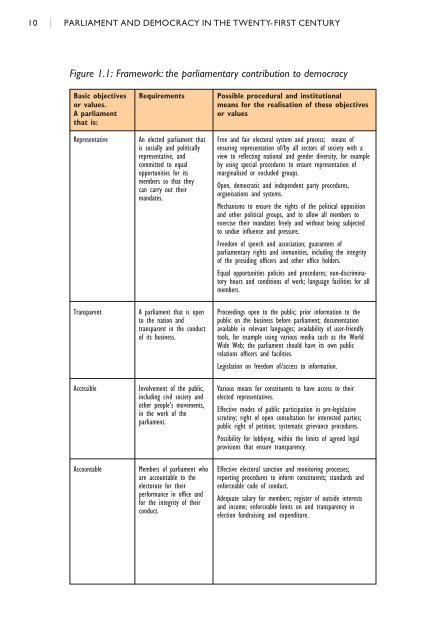PARLIAMENT AND DEMOCRACY - Inter-Parliamentary Union
PARLIAMENT AND DEMOCRACY - Inter-Parliamentary Union
PARLIAMENT AND DEMOCRACY - Inter-Parliamentary Union
You also want an ePaper? Increase the reach of your titles
YUMPU automatically turns print PDFs into web optimized ePapers that Google loves.
10 I <strong>PARLIAMENT</strong> <strong>AND</strong> <strong>DEMOCRACY</strong> IN THE TWENTY-FIRST CENTURY<br />
Figure 1.1: Framework: the parliamentary contribution to democracy<br />
Basic objectives<br />
or values.<br />
A parliament<br />
that is:<br />
Representative<br />
Transparent<br />
Accessible<br />
Accountable<br />
Requirements<br />
An elected parliament that<br />
is socially and politically<br />
representative, and<br />
committed to equal<br />
opportunities for its<br />
members so that they<br />
can carry out their<br />
mandates.<br />
A parliament that is open<br />
to the nation and<br />
transparent in the conduct<br />
of its business.<br />
Involvement of the public,<br />
including civil society and<br />
other people’s movements,<br />
in the work of the<br />
parliament.<br />
Members of parliament who<br />
are accountable to the<br />
electorate for their<br />
performance in office and<br />
for the integrity of their<br />
conduct.<br />
Possible procedural and institutional<br />
means for the realisation of these objectives<br />
or values<br />
Free and fair electoral system and process; means of<br />
ensuring representation of/by all sectors of society with a<br />
view to reflecting national and gender diversity, for example<br />
by using special procedures to ensure representation of<br />
marginalised or excluded groups.<br />
Open, democratic and independent party procedures,<br />
organisations and systems.<br />
Mechanisms to ensure the rights of the political opposition<br />
and other political groups, and to allow all members to<br />
exercise their mandates freely and without being subjected<br />
to undue influence and pressure.<br />
Freedom of speech and association; guarantees of<br />
parliamentary rights and immunities, including the integrity<br />
of the presiding officers and other office holders.<br />
Equal opportunities policies and procedures; non-discriminatory<br />
hours and conditions of work; language facilities for all<br />
members.<br />
Proceedings open to the public; prior information to the<br />
public on the business before parliament; documentation<br />
available in relevant languages; availability of user-friendly<br />
tools, for example using various media such as the World<br />
Wide Web; the parliament should have its own public<br />
relations officers and facilities.<br />
Legislation on freedom of/access to information.<br />
Various means for constituents to have access to their<br />
elected representatives.<br />
Effective modes of public participation in pre-legislative<br />
scrutiny; right of open consultation for interested parties;<br />
public right of petition; systematic grievance procedures.<br />
Possibility for lobbying, within the limits of agreed legal<br />
provisions that ensure transparency.<br />
Effective electoral sanction and monitoring processes;<br />
reporting procedures to inform constituents; standards and<br />
enforceable code of conduct.<br />
Adequate salary for members; register of outside interests<br />
and income; enforceable limits on and transparency in<br />
election fundraising and expenditure.

















